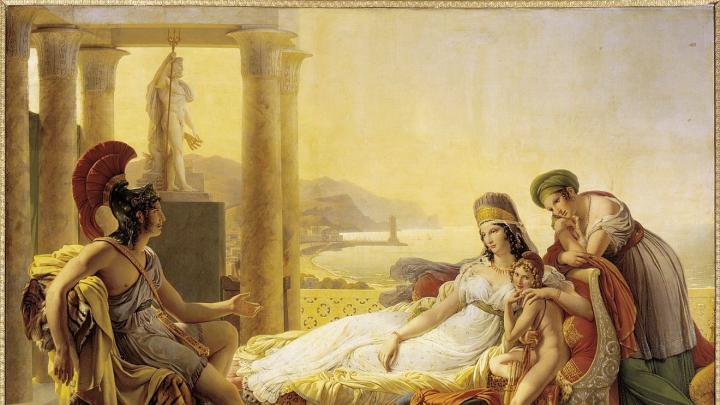In an era of Twitter and data and apps, what place is there for a 1,600-page encyclopedia devoted to a long-dead Roman poet? Lane professor of the classics Richard Thomas and Porter professor of medieval Latin Jan Ziolkowski, who directs the Harvard-affiliated Dumbarton Oaks Research Library and Collection in Washington, D.C., make the case that this is the perfect moment for the first comprehensive Virgilian reference work published in English—their three-volume Virgil Encyclopedia (Wiley-Blackwell).
Considered the greatest poet of ancient Rome, Virgil (70-19 b.c.e.) lived through the fall of the Roman republic and the beginnings of the empire, a period that included civil wars, the assassination of Julius Caesar, and the rise of Augustus. His works include the pastoral Eclogues as well as the Georgics, a series of poems ostensibly about farming, but he’s best known for the Aeneid, an epic that memorializes the founding of Rome.
“Virgil was at the center of the curriculum in the West for almost two millennia,” says Thomas. “His poetry was read, studied, and absorbed in their youth by the greatest poets, philosophers, painters, sculptors, and composers, from his own lifetime to the end of the nineteenth century and beyond.” Not only did Dante choose Virgil as his guide through the Inferno; the Roman poet’s influences appear in operas by Berlioz, paintings by Rubens, the sculpture of Bernini, poems by Frost and Heaney, the songs of the British pop singer Dido, and even in David Mitchell’s 2004 novel The Cloud Atlas. The Aeneid also became a kind of rallying cry for leaders attempting to reestablish empire, including Charlemagne, the Habsburgs, and Mussolini. “The Aeneid is coopted and used as propaganda,” Thomas says, “but in ways that Virgil didn’t anticipate.”
He and Ziolkowski say they wanted to make the encyclopedia useful to readers from scholars to high-school Latin teachers. Prior to their work, the most recent comprehensive reference source for Virgil was written in Italian, and its first volume appeared nearly 30 years ago. Changes in the field—including an increased emphasis on reception, how readers respond to and reinterpret a text at different points in history—made a new encyclopedia overdue. A digital version will, the editors hope, make periodic updates possible. But they also see the printed volumes as important. “I think, particularly with canonical authors like Dante or Shakespeare or Virgil,” Ziolkowski says, “people find great solace in the idea of sitting down and actually holding the whole text in their hands and engaging with it.”
That text includes 2,200 entries written across nearly a decade by more than 350 scholars. Of the experts invited to take part, a surprising number responded with enthusiasm, “without trying to demur and wriggle out of it,” Ziolkowski reports. “Many of them feel almost a sense of personal gratitude to Virgil for having opened doors to them as literary critics, for having led to events or travels, or encounters with other people that they value.” The editors are no different. Growing up in New Zealand, Thomas had a childhood friend whose father and uncle were beekeepers, and the boys often watched them collect honey. When that friend died in college, Thomas found comfort in Virgil’s verses about the “tiny and fragile world” of bees. Ziolkowski vividly remembers “the mixture of fear and pleasure” he felt as a teenager reading Virgil with a no-nonsense Latin teacher, and notes that his father, Theodore Ziolkowski, who wrote Virgil and the Moderns, shaped his own thinking about the poet.
The entries cover a vast array of subjects: Aeneas’s doomed lover, Dido; Wilfred Owen, the British World War I poet who took cues from the Aeneid; the presence of Virgil in music. An entry by Michael Sullivan, Ph.D. ’07, a classical philologist and research associate at Dumbarton Oaks, explores the debate about inscribing a verse from Virgil on the 9/11 monument, and the entries written by Thomas include one on the singer-songwriter Bob Dylan. The editors say there are topics to interest every reader; Ziolkowski compares the encyclopedia to “enabling people to walk down this wonderful corridor in a marvelous museum and to look through the doorways into rooms that are filled with beautiful paintings or objects. We can give them the excitement and the information they need,” so that someday “they might want to come back to those rooms and spend more time.”








